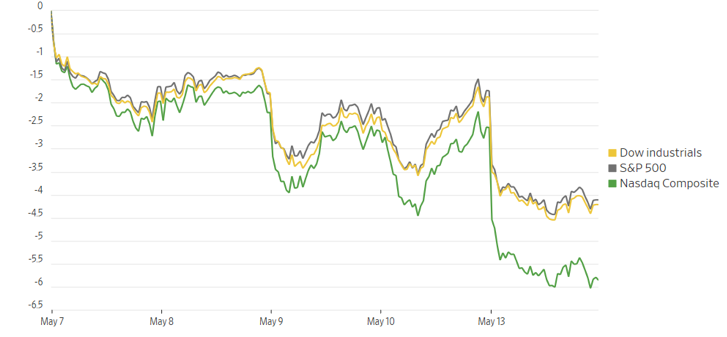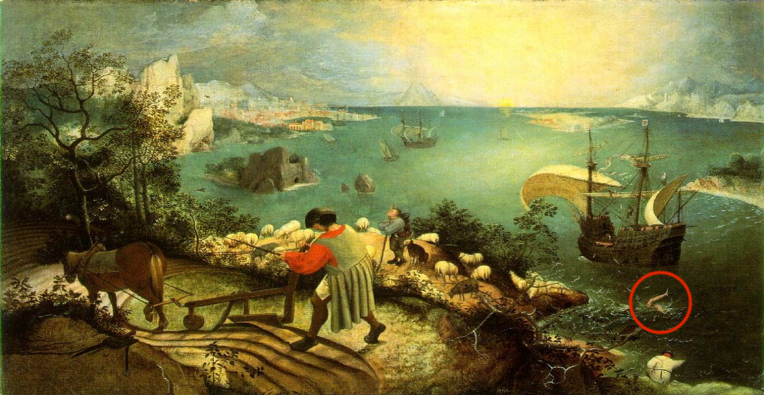It seems that in the midst of the markets’ significant drop yesterday, I had not paid attention to the tweet by Bruegel. Have you seen the tweet by Pieter Bruegel? He seems to be disturbed by what he calls a rebellion against the natural order of things. He seems to be beyond being upset with a particular motif of hubris against nature, and the cosmos. His tweet made me to go back and see again his paintings on the Tower of Babel, the rebellion of the angels against God, and also that one with the man who foolishly attempts to defend himself against death with a sword. I thought I had grasped the message, until he tweeted again: “How about my painting titled the Landscape with the Fall of Icarus?”
But let’s return to the market action for now. As the figure below shows, during the last 6 trading sessions, the markets have started experiencing a bloodbath, whose downward trend may continue for a few more days given the rising uncertainties regarding trade talks, retaliatory measures, potential tariffs against EU cars, Middle East tensions around Iran, Brexit dead-end talks, rising populism, and boneheaded mentalities.
Source: SIX, Wall Street Journal
The chances that some of the damage done in trade talks may be irreversible – due to lost trust – are pretty high, which in turn will downgrade business and consumer confidence as well as expectations. All these will trimmer growth in sales, earnings, and thus will hit incomes and consequently the equity markets, while safe havens such as US bonds, the dollar, and precious metals should make further gains.
The rattled markets worldwide may start becoming more nervous as some support levels are broken and/or the 200-day moving averages in some indexes is also broken. Furthermore, if the downturn continues, we expect volume to pick up creating a negative feedback mechanism, like it did last fall when the markets started falling in October. Thus, while the markets until late last week remained relatively subdued, yesterday’s action may exacerbate the sell-off. This is what thin liquidity always does. The negative correlation between volatility and liquidity could be a prelude to further market drops.
Until last week, the markets had underestimated the risks of a prolonged US-China trade war. If the disputes continue, we expect the dollar to strengthen, which will hurt the fate of emerging markets, and the latter will create another feedback loop which in turn will contribute to rising capital flights and risks across the globe.
Xi Jinping is facing a painful if not damaging dilemma between protecting his aura of indomitability or retreat after president’s Trump accusations of reneging on an agreement. At the same time the efforts to isolate Iran and push them to a corner, could – even by accident – inflame passions and as boneheaded policies abound, we wouldn’t be surprised if oil prices start spiking again and such spiking discouraging spending out of fear due to rising geopolitical tensions.
An escalation of the trade war could contribute to rising price pressures – especially given the tight labor market in the US – at a time when the US consumer will end up paying for the tariffs. Therefore, while some analysts have taken as a given that the next move by the Fed will be to lower interest rates, we maintain that this cannot be taken for granted.
We cannot fall into the trap of thinking that China will capitulate to US demands. Chinese exports to the US make up about 3.6% of Chinese GDP. The hit that the Chinese economy will suffer due to the reduced exports will be countered with loose fiscal and monetary measures. Chinese growth exceeds the cost of borrowing money, and hence budget deficits in China are presently de minimis.
Icarus in high spirits ignored his father’s warning. He flew too close to the sun. The wax melted and Icarus fell into the sea. All we can see of him in Bruegel’s painting are his two legs in the water! In the picture the other actors (the shepherd, the farmer, and even the angler who is nearby Icarus), remain stoics. They are not concerned about gods who fall from heaven. They had taken their precautionary measures. They obey the natural laws and leave the lawbreaker to simply drown.
Once again, ode to hedging and please don’t lose sight of finance’s engine through the centuries!


